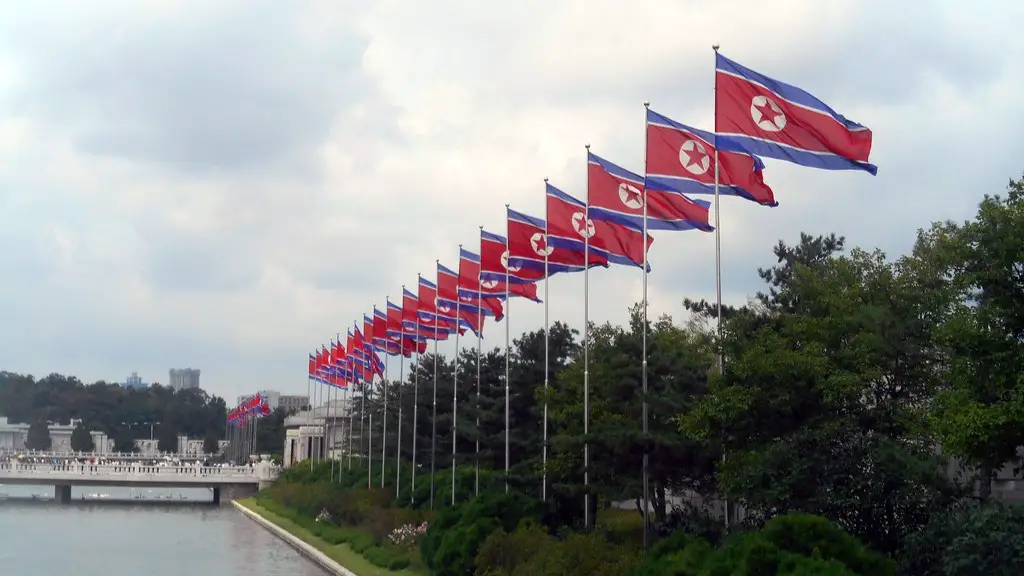Though it’s been seven decades since the Korean Peninsula was divided into two countries, North Korea and South Korea, it is still very much in ideological conflict. While South Korea is a democracy and one of the top 15 wealthiest countries in the world, North Korea is still at odds with the rest of the world, both economically and politically, with a lack of private business opportunities. To understand why private businesses are outlawed in North Korea, it’s important to comprehend the role and influence the government has had on North Korean society.
The North Korean government, ruled by Kim Jong-un, has enacted stringent laws preventing and curtailing the growth of small businesses, which are seen as a threat to government control. North Korea has operated under a highly authoritarian form of government since its inception, and private businesses were always seen as a potential source of instability. As a result, the government has enforced strict regulations and prevented the development of such businesses in most sectors.
The lack of private business has caused a great amount of economic strain in the country. With no opportunities for private investments, the North Korean economy has suffered, lacking the resources and capital needed to compete with its neighbors in the rest of the world. North Korean leaders have consistently discouraged entrepreneurial innovation, citing the potential for rebellion and politicians’ control of the economy as justification for their actions.
In addition to fearing the potential for a challenge to the status quo, North Korean leaders do not want to be perceived as favoritism when it comes to certain sectors of the economy, such as trade and technology. Therefore, private businesses have been shut down and curtailed to ensure complete government control and centralization of resources and wealth. This has been detrimental to the economy, as private businesses are seen as essential for a healthy economy, not only generating jobs but also providing innovative solutions.
The limited freedom and opportunity to establish private businesses also has a chilling effect on the motivation and morale of North Koredans. Without incentives to succeed or the ability to realize their goals and dreams, many North Korean citizens have simply given up hope and remain discouraged. Without the ability to start private businesses and create wealth, North Koreans find it difficult to realize their true potential.
There have been steps taken recently to try to address the lack of private businesses. The government has taken steps to encourage investment and entrepreneurship with incentives, such as tax breaks, reduced regulations, and other investment opportunities. Nonetheless, it is uncertain whether these measures are enough to reshape the North Korean economy and whether private businesses will be allowed to thrive.
The Impact on North Korea’s Economy
The lack of private businesses has had a noticeable impact on North Korea’s economy. With no commercial motivation from the private sector and almost total control by the state over the market, the North Korean economy has suffered greatly in comparison to its neighbors. This can be seen in the amount of aid that North Korea receives from the UN and other international organizations. The North Korean government has repeatedly relied on aid to prop up its economy, illustrating the significant economic slowdown the nation has gone through due to the lack of private businesses.
Furthermore, this decrease in economic activity has resulted in fewer jobs and opportunities for North Korean citizens. Since private businesses are so heavily regulated and heavily taxed, it becomes almost impossible for them to succeed, leading to a lack of motivation and ambition in the state. This has caused a great amount of brain drain, with citizens emigrating to South Korea or other countries in search of economic opportunity or a better life.
Lastly, the lack of private businesses in North Korea has led to higher prices for goods and services. With no competition and limited access to resources, North Korean businesses have had to cut corners and corner the market, leading to an exorbitant pricing structure that citizens have difficulty affording.
The Implications for North Korean Citizens
The lack of private businesses in North Korea has had a variety of implications for North Korean citizens. As the state continues to repress individual freedoms and opportunities, citizens are often limited in their ability to reach their potential and live their lives with the autonomy they desire. This has negative psychological effects, with many North Koreans feeling as though they are living in an oppressive environment and unable to access the same opportunities that their neighbors to the south have access to.
Furthermore, the lack of private business opportunities has meant that many North Koreans are dependent on the government for their income. This reinforces the government’s hold over the economy, providing them with an effective way to keep citizens in check and stifle any opposition. This has had a detrimental impact on free speech and other civil liberties, reinforcing the authoritarian hold the state has over its citizens.
International Reactions
International reactions to the lack of private businesses in North Korea have generally been negative. Many countries and international organizations have condemned North Korea for its actions, citing a lack of human rights and economic freedom. The UN has consistently spoken out against the North Korean government and its policies, including the lack of private business opportunities. The UN has also imposed sanctions on North Korea in order to incentivize compliance with international law.
The US has long been one of the most outspoken critics of North Korea’s policies, using diplomatic and economic pressure to try to influence North Korea’s behavior. However, despite a number of United Nations sanctions and international condemnations, the North Korean government has been steadfast in its refusal to change its policy. This has proven to be a major obstacle to improving North Korea’s human rights and economic welfare.
Potential Solutions
Though it remains to be seen whether the North Korean government will reform its policies and laws on private businesses, there are potential solutions being explored. Many experts believe that direct dialogue and negotiations between the North Korean government and its international counterparts are the most likely to yield results, as this can provide the opportunity to learn more about the situation and come to an understanding of the motivations behind it. There is also the possibility of increased economic pressure, such as trade sanctions, or even direct investment or aid to enable the development of private businesses.
In addition, some countries have sought to provide economic assistance to North Korean citizens, particularly those seeking to establish small businesses. By providing access to capital and resources, it is hoped that this can help provide the economic incentive and opportunities needed for small businesses to flourish. Finally, international organizations are exploring ways to provide technical assistance and training to North Koreans, who can then use their skills to develop their own businesses.
The Benefits of Private Businesses
There is a great potential for benefit should North Korea open up its economy to private businesses. This would help create more jobs and opportunities for North Koreans, who would have the chance to develop innovative solutions to their country’s many challenges. Moreover, it could also help generate more capital and resources for the North Korean economy, which could be used to develop infrastructure, help fund public services, and promote economic growth.
Furthermore, allowing private business to thrive could also help strengthen the North Korean government. With more economic freedom, citizens would be more likely to support the government, providing them with the resources needed to overcome some of the nation’s most pressing issues. Additionally, allowing private businesses to flourish could also attract more foreign investment, which would be a boon to the North Korean economy.
The Way Forward
Moving forward, it is important to recognize that the lack of private businesses in North Korea is a result of a long and complicated history. Though the North Korean government has been consistently resistant to change, it is important to note that North Korean citizens need and deserve access to opportunities, job prospects, and a more open economy. It is essential that the international community continues to push the North Korean government to end its repressive policies and open up its economy to private businesses, in order to ensure the economic prosperity of North Koreans and the broader Northeast Asian region.




